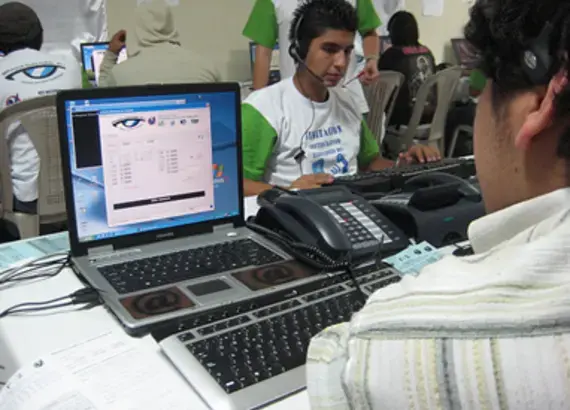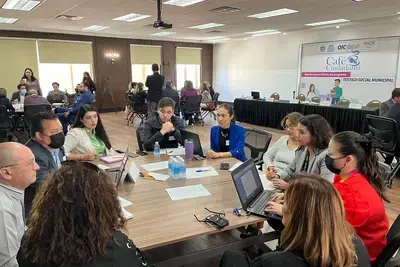
Success Story
Guatemalan Quick Count Aided Public Confidence In Presidential Runoff Results
Election observation efforts by Guatemalan citizen groups, including NDI’s partner Citizen Action (Acción Ciudadana, AC), helped increase public confidence in the integrity of last month’s presidential runoff election and head off a repeat of problems associated with the first round of voting.
During that initial September poll, candidates and parties raised concerns about delays in the release of results, which were also blamed for several incidents of violence, including the burning of election materials.
For the Nov. 6 runoff, AC, the Guatemalan chapter of Transparency International, released projected results that confirmed the Supreme Electoral Tribunal (Tribunal Supremo Electoral, TSE) results. AC’s quick count tally, based on its observations at a statistically representative sample of polling places, differed by only 0.22 percentage points, well within the count’s 1 percent margin of error.
For both elections, AC dispatched approximately 3,500 observers to the country’s 333 municipalities, working as a member of Election Watch (Mirador Electoral), a coalition of citizen groups that organized observation activities for both rounds. Observers noted that during the second round Guatemalans were able to vote without problems at 93 percent of the observed polling stations, a 20 percent increase from the first round. During the runoff, 97 percent of observed polling stations had party poll watchers from two parties. Observers help parties independently verify the impartiality of poll workers and whether there are irregularities in the election process.
The runoff pitted former army general Otto Perez Molina of the Patriotic Party (Partido Patriota) against businessman Manuel Baldizón of the Renewed Democratic Freedom Party (Libertad Democrática Renovada). Despite expectations of a tight race, Perez Molina won 54 percent to Baldizón’s 46 percent.
With NDI assistance, Guatemalan election observation groups, including Election Watch, will draw on their election reports to help develop and advocate for electoral reforms to improve future elections. Campaign spending is one area expected to receive attention; both participants in the runoff far surpassed the campaign spending limit set by electoral law and regulated by the TSE.
From the May 2 start of the campaign period through the end of the second round on Nov. 6, AC’s Anti-Corruption Legal Assistance Office (Centro de Asistencia Legal Anticorrupción) received over 500 complaints related to the electoral process. During the first round, reports included illegally transporting voters for one municipality to another, vote buying, voter intimidation and campaigning outside of the permitted campaign period. There were fewer reports during the second round.
Nearly half of all problems reported involved voters whose names were missing from the voter registry, and almost one-third involved ballot shortages. In the first and runoff rounds, some 17 percent and 7 percent of voters, respectively, experienced problems related to identification cards—such as the fact that some were damaged and therefore not accepted. As Guatemala transitions to new voter cards, both old and new ID cards were accepted, adding a complicating element to the voting process.
Prior to the election, approximately 1.3 million voters were added to the voter rolls — particularly women, youth and indigenous people. This meant that for the first time women represented the majority of the seven million registered Guatemalan voters. According to electoral authorities, turnout among registered voters was approximately 69 percent during the first round and 61 percent during the second round —considerably greater than the 2007 elections, when turnout in the two rounds was 60 percent and 48 percent, respectively.
Mirador Electoral Members
- Citizen Action (Acción Ciudadana, AC)
- Association for Development, Organization, Services and Sociocultural Studies (Asociación para el Desarrollo, la Organización, Servicios y Estudios Socioculturales, DOSES)
- Latin American Faculty of Social Sciences (Facultad Latinoamericana de Ciencias Sociales, FLACSO)
- Central American Institute for Political Studies (Instituto Centroamericano de Estudios Políticos, INCEP)
- More Women, Better Politics (Más Mujeres, Mejor Política, MMMP)
- National Network of Mayan Youth Organizations (Red Nacional de Organizaciones de Jóvenes Mayas, RENOJ)
Related:
Published Dec. 9, 2011



